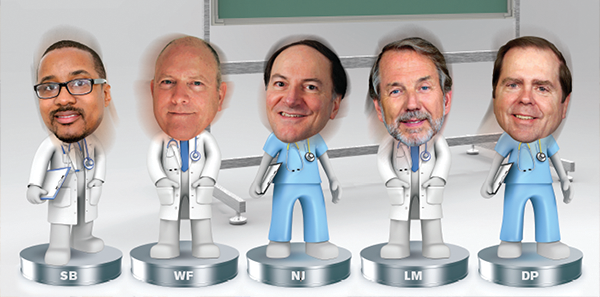
NJ: I think it’s ironic that we’re all saying many similar things. Wes, sorry we’re not as smart as you out there on the West Coast. You eloquently quote smart people; we quote rock and roll. To me, it’s, “You can’t always get what you want.” Even with my residents, I talked to them just this morning about getting jobs when they finish in June, and everyone has this idealized vision that they have to get everything exactly perfect. The reality is it doesn’t exist. Perfection is in the eye of the beholder. What works for one graduate is inappropriate for another, and this idealized vision that you’re going to get to vote on everything or get 100 percent bonus every single day just doesn’t exist. There are a lot of requirements regulatory and otherwise now, much more than when I started. The practice is much more complex than it ever was, and it’s not going in the other direction; it’s going to get even worse. You have to spend an inordinate amount of time dealing with non–patient care issues to get the practice working, and a lot of people just don’t want to do that. They have to come to the realization that you’re not going to get everything. There are going to be trade-offs in your practice, and we need to accept that.
Explore This Issue
ACEP Now: Vol 34 – No 11 – November 2015SB: I would agree. I think in most democratic groups there are fiduciary duties to respect the needs of the individual physician, but there are also duties to respect the needs and desires of the aggregate, and that can manifest itself in different ways. But ultimately, I think that a democratic practice attracts a special type of personality and a special type of physician. Clearly, there are sacrifices, and as long as we can define a democratic model and define the option that these young resident have when they go out into the workforce so that they truly understand what not only an idealized view of a democratic practice is but give actual working examples that are out there, I think that they can weigh all of the risks and benefits on their own.
RM: How we’re getting paid is changing, and we’ve not touched on that. The transition from fee-for-service toward a value-based system does take investments, changing organizations, growth of IT that can support it, and the ability to take on risk. What we’re seeing are a lot of independent practices in other specialties rolling up and forming new organizations, and they’re having to give up some of their autonomy as small, independent practices in order to gain market position in order to be able to take on risk. They’re also partnering with nonphysicians. They’re partnering with health systems to create new entities. How do we see that transition affecting what might be the best approach to organizing in emergency medicine? Do we continue to say we’re going to be ourselves, or do we move forward and join these consolidations? What do you see happening there, and how will that affect autonomy and democracy?





No Responses to “Emergency Medicine Leaders Discuss How Democratic Groups Manage Scale, Consolidation”